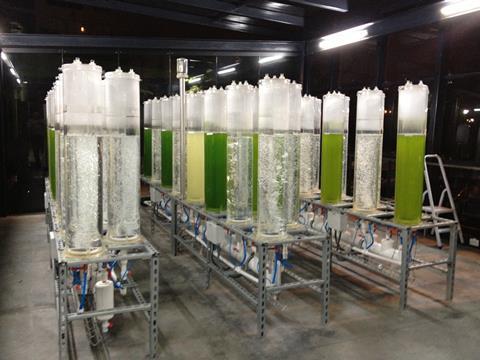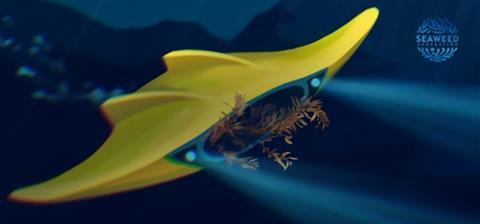When I woke up this morning, I had no idea I’d be writing an article about my life as a marine biotechnologist and how I have engineered my career to accommodate my interests, passions and approach to research. I still have no idea where this article is going to go. But at least now I have your company on wherever this journey takes us.
I’ll rewind to the start, and give you some background, hopefully after that we’ll both be able to work out where this is going. I’ve been a marine biotechnologist for around two decades. I started my research life working at a marine institute in Plymouth, and for the last 5 years I’ve been working at Exeter University. My main role at the University is to coordinate the Industrial Placement program for bioscience students when they go out during their sandwich years… which is perfect for me as you’ll soon see. It involves working with both students and companies, and the projects the students get involved in are incredibly diverse. As well as my university role, I am also Chief Scientific Officer for a scientific startup I co-founded last year.
Over the years, I’ve worked on lots of research topics covering viruses, bacteria, fungi, algae, seaweed, genetic modification, aerial drones, underwater vehicles; and have developed novel technologies for cultivating microbes (fermenters and photobioreactors), destroying microbes (sanitation), sampling the natural environment, observing coral reef health, and processing microbial biomasses (dewatering/harvesting, conversion and extraction). I study the smallest of molecules of life through atomic force microscopy, to a gigatonne vision for carbon dioxide removal via automated robots. I have travelled the world and met some amazing people from all sorts of scientific and engineering backgrounds who have helped me along the way.
I have two general rules for my research: it has to be either cool or lucrative.
Or ideally both, but you don’t always get your way. They each support the other: the lucrative work (usually industry funded) gives you the financial resources to take on risky fun research (usually very academic and speculative). Meanwhile the fun research keeps your brain stimulated when you have to deliver on mundane lucrative stuff. That’s my model of work, and it seems to have worked out ok. I also only work with people I enjoy working with. Work is much easier when you have fun people around you.
I find it difficult to label myself, I’m a biotechnologist to some people, an engineer to others, a virologist to some, the list goes on… but the theme is usually woven through my general microbiology interests. I like to think of myself as someone who traverses diverse topics and subject areas. I’m neither academic nor industrial, I consider myself both. I understand what drives academia, and I understand what drives industry. Spending equal time with both sectors, you learn the strengths, the weaknesses, the opportunities and, most importantly, the language of how to communicate and translate between the often very different communities and their approaches. My strength is being able to bring different subject areas together, my weakness is there are so many subject areas I am always moving on to the next thing that interests. A key skill I think I have is learning, and then applying, concepts I glean from different areas to new and old challenges.
I got into science because I love research, I love the buzz you get from discovering something new. And being able to extract value and meaning from that knowledge to make a difference to someone’s life is why I really love the biotechnological aspect.

I progressed rapidly through the ranks as an early career scientist. Perhaps too rapidly. My reward for my early lab exploits was an early transition into managing research rather than undertaking my own bench work. But I soon realised that this was a massive advantage for someone working between vastly different areas: you can recruit and work with real experts, rather than having to learn to do all the different practical techniques yourself. Sometimes I think of myself as a glue, bringing people together; sometimes as an oil, allowing people to work together.
There have been many key moments along my career path. Some seemed significant at the time, others took years for their relevance or lessons learned to become apparent. There isn’t a straight and obvious path that I’ve taken, more of a matrix comprising a series of parallel, sometimes convoluted, paths that come together at times and diverge in different directions at others. I once sketched it out for a lecture on innovation to some undergraduates. It was terrifying to see it all on one page.
With the benefit of hindsight, I can outline an approximate straight path to this exact moment, whilst remembering that this is just one of many pathway stories I could have chosen to get the place I’m at now. The ‘straight’ path to where I’ll be in the future might be different. My work on microalgal viruses (in particular the amazingly awesome coccolithoviruses) got me noticed by a large multinational oil company who enlisted my help to isolate viruses for a microalgal biofuel process they were developing at the time. It was a fascinating project, which taught me one massive lesson: it’s all about the numbers. If the numbers don’t add up, then industry is simply not interested. And the numbers can change, and often it’s entirely beyond your control. Timing is everything, I remember pitching a biofuels project one day when the price of oil was negative! Talk about bad timing, it didn’t go well but we all had a laugh at the situation. You have to be able to deal with it and keep moving on.

After the algal virus biofuel project I realised the numbers were always going to be stacked against biofuels unless someone solved the real problem which was simply an energy return on investment calculation. Taking a look at the bigger picture, I realised that it wasn’t a series of individual problems of strain selection or cultivation technology or location or processing…. It was a problem with all of them and how they interacted with each other, the constraints they imparted on each part they touched, with certain aspects being real bottle necks. Breaking the problem up into smaller manageable chunks can be fine, but unfortunately for the grander and bigger challenges, quite often when you reassemble the chunks back together for the larger whole, it simply doesn’t work anymore. There are too many constraints introduced along the way. You can solve every little challenge, but not in a line and not in a way that is practical and sustainable for the grander complete challenge. So, I instead challenged myself to do better. I decided I would try to be the person who understood enough about the biology, the engineering, the applications and the market, to make a real difference.
There have been some notable successes along the way. I’ve developed various photobioreactor designs, many of which are now commercially available. I’ve worked on isolating novel algal strains which are now cultivated for their use as agricultural biostimulants. A technology I was developing for simultaneous dewatering and processing of microalgae found application as a sanitation technology in the developing world, is at TRL7 and has been tested on five continents. And all of these solutions have been developed through a holistic approach, considering the whole process continually and constantly determining the ripple effects from every decision made.
Over the past decade or so, I’ve been trying to help solve the three challenges which I thought were the major threats to humanity and our way of life: energy, water and food security. Those were the main challenges I thought humankind was facing. Until recently. Then I saw the even bigger picture. Climate change impacts on all three, and then some. But fortunately, I recognised that my entire career to date has been building up to face this challenge. We need to remove the carbon dioxide from the atmosphere. And quickly. But unfortunately, we need to do this in a way that is seen as providing value for money. We need to industrialise saving the planet. This means we need academics interacting with big business and vice versa. We need scientists and engineers interacting with each other. We need a glue and an oil. We need to purposely geo-engineer the planet to undo the damage we have and continue to cause to it. There’s no point sugar coating this message. I’m a strong believer in globally scalable nature-based solutions, and mankind’s potential for technological innovation.

So, that’s what we do at Seaweed Generation: we use the power of robotics to harness the power of seaweed to reverse climate change. From single seed cells to fully mature seaweeds to their microbial degradation fate on the deep sea floor, we using robots to undertake, control and measure the impacts of actions. If it sounds like the microbiology aspect of my work is now in the past….. you’d be completely wrong. It’s just as important as its always been: we need to cultivate and maintain seeding spores of macroalgae, the large scale cultivation in the open ocean is going to impact on phytoplankton and other microbial communities, while sinking the biomass in to the deep ocean might impact on the microbial communities down there which will degrade material which doesn’t sediment. It all needs to be monitored for any unintended consequences and to verify that we are doing what we say we are doing. Thankfully I have experience of running a 20 year microbial time series. Forgot to mention that earlier, I didn’t think it was relevant at the time, but it seems important now! And I guess that’s the theme to my career, my work and my approach to research. I apply the knowledge and experience I have gathered in the past in very different areas, to new areas and projects and challenges as I move into the future.
You may think that an avenue of work has come to an end, but really they are just on hold until you find a new application for the know how and insights you have gained from them. Moving into new fields allows you to see these opportunities. Don’t be afraid to shift into new fields and apply your knowledge. You may well have to in the future if things get as bad as I think they’re going to get. I look forward to working with you….










No comments yet